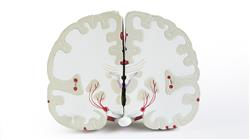University certificate
The world's largest faculty of education”
Introduction to the Program
You will be able to take an advanced program compatible with your professional responsibilities. Grow in your sector thanks to TECH"

The progress of science has led to a better understanding of how the brain works and also the direct connection between behavior, emotions and the physical well-being of the person. The correct development in the emotional field in early ages will favor not only social skills in this stage of life, but also in adulthood, where people with better mental and physical health can be found.
This program in Psychoneuroimmunoendocrinology proposed by TECH offers the teaching professional an exhaustive syllabus developed by a specialized teaching team that will immerse them in this discipline over the course of 6 months. Therefore, the students of this program will delve into the beginnings of neuropsychology, the basics of neuroanatomy and principles of functional neuroanatomy, which will lead them to know the different areas of the brain and how they function.
This acquisition of advanced knowledge will be possible thanks to the syllabus composed of didactic material in which the latest technology applied to the academic sector has been used. This way, students have at their disposal video summaries, detailed videos, interactive diagrams, which are complemented with essential readings and simulations of real clinical cases. Besides, this institution uses the Relearning system in all its programs. Based on the reiteration of content, it allows students to progress through the program in a more natural and agile way.
The teaching professional is faced with a program in an exclusively online mode that provides flexibility, as there is no classroom attendance or sessions with fixed schedules. All you need is an electronic device to access the entire syllabus hosted on the virtual platform. This way, you can connect wherever and whenever you want, distributing the study load according to their needs. An intensive program that will allow you to combine your professional and/or personal responsibilities with an education that employs modern educational tools.
A university diploma that will take you through the relationship between the nervous system and the immune system. Enroll now”
This Postgraduate diploma in Psychoneuroimmunoendocrinology contains the most complete and up-to-date program on the market. Its most notable features are:
- The development of practical cases presented by experts in Psychology and Immunology
- The graphic, schematic, and practical contents with which they are created, provide scientific and practical information on the disciplines that are essential for professional practice
- Practical exercises where the self-assessment process can be carried out to improve learning
- Its special emphasis on innovative methodologies
- Theoretical lessons, questions to the expert, debate forums on controversial topics, and individual reflection assignments
- Content that is accessible from any fixed or portable device with an Internet connection
You can easily, from your computer and whenever you want, access the most complete syllabus on Psychoneuroimmunoendocrinology"
The program’s teaching staff includes professionals from sector who contribute their work experience to this program, as well as renowned specialists from leading societies and prestigious universities.
The multimedia content, developed with the latest educational technology, will provide the professional with situated and contextual learning, i.e., a simulated environment that will provide immersive education programmed to learn in real situations.
This program is designed around Problem-Based Learning, whereby the professional must try to solve the different professional practice situations that arise during the academic year. For this purpose, the student will be assisted by an innovative interactive video system created by renowned and experienced experts.
Do you know the relationship of the hypothalamus with the endocrine system? Delve into it with this Postgraduate diploma"

TECH uses the latest technology applied in education to advance your career in a more dynamic and visual way"
Why study at TECH?
TECH is the world’s largest online university. With an impressive catalog of more than 14,000 university programs available in 11 languages, it is positioned as a leader in employability, with a 99% job placement rate. In addition, it relies on an enormous faculty of more than 6,000 professors of the highest international renown.

Study at the world's largest online university and guarantee your professional success. The future starts at TECH”
The world’s best online university according to FORBES
The prestigious Forbes magazine, specialized in business and finance, has highlighted TECH as “the world's best online university” This is what they have recently stated in an article in their digital edition in which they echo the success story of this institution, “thanks to the academic offer it provides, the selection of its teaching staff, and an innovative learning method aimed at educating the professionals of the future”
A revolutionary study method, a cutting-edge faculty and a practical focus: the key to TECH's success.
The most complete study plans on the university scene
TECH offers the most complete study plans on the university scene, with syllabuses that cover fundamental concepts and, at the same time, the main scientific advances in their specific scientific areas. In addition, these programs are continuously being updated to guarantee students the academic vanguard and the most in-demand professional skills. In this way, the university's qualifications provide its graduates with a significant advantage to propel their careers to success.
TECH offers the most comprehensive and intensive study plans on the current university scene.
A world-class teaching staff
TECH's teaching staff is made up of more than 6,000 professors with the highest international recognition. Professors, researchers and top executives of multinational companies, including Isaiah Covington, performance coach of the Boston Celtics; Magda Romanska, principal investigator at Harvard MetaLAB; Ignacio Wistumba, chairman of the department of translational molecular pathology at MD Anderson Cancer Center; and D.W. Pine, creative director of TIME magazine, among others.
Internationally renowned experts, specialized in different branches of Health, Technology, Communication and Business, form part of the TECH faculty.
A unique learning method
TECH is the first university to use Relearning in all its programs. It is the best online learning methodology, accredited with international teaching quality certifications, provided by prestigious educational agencies. In addition, this disruptive educational model is complemented with the “Case Method”, thereby setting up a unique online teaching strategy. Innovative teaching resources are also implemented, including detailed videos, infographics and interactive summaries.
TECH combines Relearning and the Case Method in all its university programs to guarantee excellent theoretical and practical learning, studying whenever and wherever you want.
The world's largest online university
TECH is the world’s largest online university. We are the largest educational institution, with the best and widest online educational catalog, one hundred percent online and covering the vast majority of areas of knowledge. We offer a large selection of our own degrees and accredited online undergraduate and postgraduate degrees. In total, more than 14,000 university degrees, in eleven different languages, make us the largest educational largest in the world.
TECH has the world's most extensive catalog of academic and official programs, available in more than 11 languages.
Google Premier Partner
The American technology giant has awarded TECH the Google Google Premier Partner badge. This award, which is only available to 3% of the world's companies, highlights the efficient, flexible and tailored experience that this university provides to students. The recognition as a Google Premier Partner not only accredits the maximum rigor, performance and investment in TECH's digital infrastructures, but also places this university as one of the world's leading technology companies.
Google has positioned TECH in the top 3% of the world's most important technology companies by awarding it its Google Premier Partner badge.
The official online university of the NBA
TECH is the official online university of the NBA. Thanks to our agreement with the biggest league in basketball, we offer our students exclusive university programs, as well as a wide variety of educational resources focused on the business of the league and other areas of the sports industry. Each program is made up of a uniquely designed syllabus and features exceptional guest hosts: professionals with a distinguished sports background who will offer their expertise on the most relevant topics.
TECH has been selected by the NBA, the world's top basketball league, as its official online university.
The top-rated university by its students
Students have positioned TECH as the world's top-rated university on the main review websites, with a highest rating of 4.9 out of 5, obtained from more than 1,000 reviews. These results consolidate TECH as the benchmark university institution at an international level, reflecting the excellence and positive impact of its educational model.” reflecting the excellence and positive impact of its educational model.”
TECH is the world’s top-rated university by its students.
Leaders in employability
TECH has managed to become the leading university in employability. 99% of its students obtain jobs in the academic field they have studied, within one year of completing any of the university's programs. A similar number achieve immediate career enhancement. All this thanks to a study methodology that bases its effectiveness on the acquisition of practical skills, which are absolutely necessary for professional development.
99% of TECH graduates find a job within a year of completing their studies.
Postgraduate Diploma Psychoneuroimmunoendocrinology
The connection between the mind and the body has been the subject of study for centuries, in this sense, it has been proven that there is a close relationship between the nervous system, the endocrine system and the immune system. Psychoneuroimmunoendocrinology is a discipline that studies this connection and how it influences people's health and well-being. Would you like to explore this field in depth? Then the Postgraduate Diploma Psychoneuroimmunoendocrinology created by TECH Global University is the ideal option for you. This program was designed with the objective of providing you with the knowledge and skills necessary to become an expert in psychoneuroimmunoendocrinology. The program has a 100% online modality of study and is composed of innovative teaching resources that will give a plus to your educational experience. The syllabus will allow you to explore the latest research and discoveries in this area and how to apply them in the real world.
Discover psychoneuroimmunoendocrinology
.
This TECH Postgraduate Diploma represents a unique opportunity to delve into the knowledge of the interrelationship between the nervous, endocrine and immune systems and how they influence people's health. Through a theoretical-practical approach, you will learn about the latest research and discoveries in this area and how to apply them in the real world. Here, you will find the most up-to-date and complete syllabus in the market, its content and methodology were designed by professionals from the sector, who will provide you with a progressive and efficient experience. As you progress through the program, you will become familiar with the use of technological tools and pedagogical techniques for online teaching, which will allow you to enhance skills that will be useful in any field of education. After completing the program, you will become an expert in psychoneuroimmunoendocrinology, being able to face the challenges of the professional world with success.







